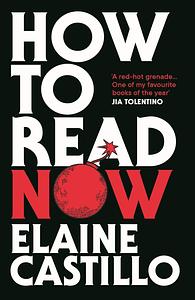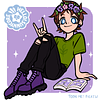Take a photo of a barcode or cover
Not for the weak of heart…love the unapologetic, confident writing. Not 5 stars for me because the essays (or chapters) would get convoluted and go off on too many tangents at times. Overall, I highly recommend this book!
challenging
informative
slow-paced
A collection of essays that started off strong, and ended strong, but really floundered for a bit in the middle there. I can’t tell if I was getting bogged down with the long-winded millennial-esque writing (even for Me there was too much astrology talk, and I laughed out loud when the writer honest-to-God used the word “nothing-burger”) or if I just wasn’t getting it, but the middle essays seemed to go on forever and not have anything of note to say.
For what it’s worth, the most egregious of the essays was Main Character Syndrome, where the author seemed to use as her personal journal to explain why she hated Joan Didion, and (as someone who’s never engaged with Didion even in passing) this was of no interest to me. There was something in there about Didion representing the settler-colonial mindset in the American West, specifically California, but it was kernels in literally fifty pages of my Kindle just ranting about Joan Didion. Again, I’m a Canadian with no prior knowledge of Joan Didion whatsoever, so your mileage may vary, I suppose.
However, where the essay collection was strong it was quite strong. In particular, Reading Teaches Us Empathy And Other Fictions and Autobiography in Asian Film were standouts for me. They both (the former moreso than the matter) suffered from the longwindedness that plagued all of this collection that made sentences require many rereads before I fully understand it, but I enjoyed them regardless.
I saw someone say that this collection works better as a syllabus and I’m inclined to agree - many of the weaker works fell flat for me because I had no connection to the source material the entire essay was based around, but it made everything seem so interesting that I highlighted quite a few articles for further reading - not to mention the semi-annotated bibliography, that gushes about several works that inspire and are mentioned in this collection.
For what it’s worth, the most egregious of the essays was Main Character Syndrome, where the author seemed to use as her personal journal to explain why she hated Joan Didion, and (as someone who’s never engaged with Didion even in passing) this was of no interest to me. There was something in there about Didion representing the settler-colonial mindset in the American West, specifically California, but it was kernels in literally fifty pages of my Kindle just ranting about Joan Didion. Again, I’m a Canadian with no prior knowledge of Joan Didion whatsoever, so your mileage may vary, I suppose.
However, where the essay collection was strong it was quite strong. In particular, Reading Teaches Us Empathy And Other Fictions and Autobiography in Asian Film were standouts for me. They both (the former moreso than the matter) suffered from the longwindedness that plagued all of this collection that made sentences require many rereads before I fully understand it, but I enjoyed them regardless.
I saw someone say that this collection works better as a syllabus and I’m inclined to agree - many of the weaker works fell flat for me because I had no connection to the source material the entire essay was based around, but it made everything seem so interesting that I highlighted quite a few articles for further reading - not to mention the semi-annotated bibliography, that gushes about several works that inspire and are mentioned in this collection.
challenging
informative
medium-paced
Excellent collection of essays on decolonial reading with "reading" taken as a broader approach of analyzing and interpreting the world, primarily media and art. Does not, however, provide instruction. It's more about inspiring readers to begin the work of more closely investigating their reading by providing examples of how the author has teased apart quintessential western lit for their bigoted ideologies.
i think this book does have important things to say, but its tbh quite overwritten and im really not in the headspace for that currently. + too much millenial cringe and out of the three or so chapters i have read, only one has been about a book. for a book called “how to read now”, that’s not a great ratio.
challenging
informative
tense
medium-paced
challenging
funny
informative
reflective
medium-paced
Loved this book. It's such a brilliant and thought-provoking read. Like all author's work it's one person's perspective, but I feel that it's a brilliant starting point from which to discuss some of the challenges facing publishing today. What and how we read impacts the way that we interact with society and I enjoyed how Castillo explored literature and how it intersects with film, art, and other ways we seek to understand the world. For such a long time, western readers, even those from a non-western heritage have learned about the world from a particular perspective - that being predominantly the white male. In the UK, only one percent of GCSE students study a book by a person of colour - so the history of a country, and often the world is told from a particular perspective. Moreover, when an author of colour tells a story they are often saddled with being the spokesperson or representative of a whole community of people. So much of this book resonated with me, but I also learnt a lot from it. As someone whose life has definitely been enriched by reading I could not recommend this book and author highly enough, such a great reminder to think more deeply and consciously about what and who you read and how that colours your view of the world; and for the publishing industry to think about the voices it publishes and what it expects of them. Have just ordered and am looking forward to reading her novel America is not the heart.
funny
informative
reflective
medium-paced
challenging
hopeful
informative
inspiring
reflective
medium-paced





